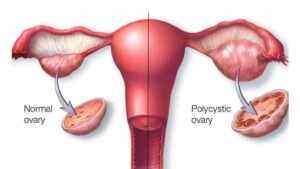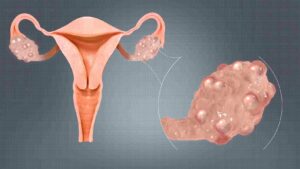Managing the symptoms of PCOS has been a longstanding challenge for both healthcare professionals and individuals facing this condition. However, the landscape of PCOS treatment is on the brink of a transformative shift, with a groundbreaking new approach that promises to redefine how we address this complex syndrome. In this blog, we’ll explore the latest advancements and new treatments for PCOS, shedding light on a novel therapy that offers hope and relief to those navigating the challenges of this condition.
Contents
Why People Need New Treatments For PCOS?
 People need new treatments for Polycystic Ovarian Syndrome (PCOS) for several compelling reasons:
People need new treatments for Polycystic Ovarian Syndrome (PCOS) for several compelling reasons:
- Incomplete Symptom Management: Current treatments often focus on symptom management rather than addressing the root causes of PCOS. New treatments aim to provide more comprehensive solutions that go beyond alleviating surface-level symptoms.
- Individual Variability: PCOS presents differently in individuals, with a wide range of symptoms and severity. Existing treatments may not cater to the diverse needs of those affected. Tailored and individualized approaches offered by new treatments can better address the unique challenges faced by each person with PCOS.
- Fertility Challenges: Many individuals with PCOS struggle with fertility issues, and existing treatments may not always effectively address this aspect. Innovative therapies that specifically target fertility-related concerns can provide renewed hope for those aspiring to build a family.
- Side Effects and Tolerability: Some individuals may experience side effects or find current treatments intolerable. New treatments may offer alternative options with improved tolerability profiles, enhancing the overall quality of life for individuals with PCOS.
- Limited Treatment Options: Currently available treatments, such as hormonal contraceptives and insulin-sensitizing medications, have limitations in terms of efficacy and may not be suitable for everyone. Diversifying the range of available treatments provides more options, allowing healthcare professionals to tailor interventions to each patient’s unique needs.
- Advancements in Medical Science: As our understanding of PCOS and medical science advances, researchers continuously strive to develop innovative therapies that target the underlying mechanisms of the condition. These advancements can lead to more effective and targeted treatments that offer improved outcomes for individuals with PCOS.
Overall, the need for new treatments for PCOS arises from the desire to provide more effective, individualized, and holistic care that addresses the diverse symptoms and challenges associated with this complex syndrome.
What Are The New Treatments For Polycystic Ovarian Syndrome?
 There have been advancements or new developments in the field of Polycystic Ovarian Syndrome (PCOS) treatment. It’s essential to consult with healthcare professionals or refer to the latest medical literature for the most up-to-date information. Generally, here are some emerging and potential new treatments for Polycystic Ovarian Syndrome:
There have been advancements or new developments in the field of Polycystic Ovarian Syndrome (PCOS) treatment. It’s essential to consult with healthcare professionals or refer to the latest medical literature for the most up-to-date information. Generally, here are some emerging and potential new treatments for Polycystic Ovarian Syndrome:
Inositols
Inositols, specifically myo-inositol and D-chiro-inositol, have shown promise in improving insulin sensitivity and ovarian function in women with PCOS. They are often used as supplements and are considered a part of the nutritional approach to PCOS management.
GnRH Agonists
Gonadotropin-releasing hormone (GnRH) agonists, such as elagolix, have been investigated for their potential to manage PCOS symptoms by regulating hormonal imbalances. These medications may have a role in improving menstrual regularity and reducing androgen levels.
Anti-Müllerian Hormone (AMH)-Lowering Agents
Given the association between elevated AMH levels and PCOS, there is ongoing research into medications that can lower AMH levels. These drugs aim to address the ovarian dysfunction characteristic of PCOS.
Fecal Microbiota Transplant (FMT)
The gut microbiome has been linked to PCOS, and FMT is being explored as a potential therapy. Modulating the gut microbiota may have implications for insulin sensitivity and other factors contributing to PCOS.
Peptide Receptor Modulators
Some investigational drugs, like relugolix, which is a gonadotropin-releasing hormone receptor antagonist, are being studied for their impact on ovarian function and hormonal balance in PCOS.
Androgen Receptor Blockers
Drugs that block the effects of androgens, such as androgen receptor blockers, are being investigated for their potential in managing symptoms like hirsutism and acne associated with PCOS.
Targeted Lifestyle Interventions
While not pharmaceutical, lifestyle interventions continue to be an essential part of PCOS management. Personalized approaches incorporating diet, exercise, and stress management are gaining attention for their potential impact on symptoms and overall well-being.
It’s crucial to note that the efficacy and safety of these treatments are still being researched, and many are in various stages of clinical trials. Additionally, individual responses to treatments can vary. Therefore, individuals with PCOS need to work closely with their healthcare providers to determine the most suitable and evidence-based treatment plan for their specific needs.
What Is The Best Treatment For Polycystic Ovary Disease?
Well, there hasn’t been a single universally recognized “best” treatment for Polycystic Ovary Syndrome (PCOS), as the condition can manifest differently in individuals. So, the treatment plans are often tailored to address specific symptoms and concerns. However, one promising and relatively recent new treatment that has shown effectiveness in addressing various aspects of PCOS is explained below.
Inositols
Inositols, specifically myo-inositol, and D-chiro-inositol, are naturally occurring compounds that belong to the vitamin B family. Research has indicated that inositols may have positive effects on insulin sensitivity, ovarian function, and hormonal balance in women with PCOS.
- Improved Insulin Sensitivity: PCOS is often associated with insulin resistance, leading to elevated insulin levels. Inositols have been shown to improve insulin sensitivity. Potentially helping to regulate blood sugar levels and reduce the associated metabolic abnormalities.
- Menstrual Regularity and Ovulation: Inositols may contribute to restoring regular menstrual cycles and promoting ovulation. This can be particularly beneficial for women with PCOS who experience irregular periods and fertility challenges.
- Reduction of Androgen Levels: Inositols may also have a role in reducing elevated androgen levels, such as testosterone. This can contribute to symptoms like hirsutism (excessive hair growth) and acne in women with PCOS.
- Well-Tolerated and Few Side Effects: Inositols are generally well-tolerated and have few reported side effects. This makes them an attractive option for individuals seeking a natural or supplement-based approach to PCOS management.
It’s important to note that while inositols show promise, individual responses to treatments can vary. Additionally, research in this field is ongoing. Healthcare providers may recommend a combination of treatments based on the specific needs and symptoms of each individual.
Is Polycystic Ovarian Syndrome Completely Curable?
 Polycystic Ovarian Syndrome (PCOS) is a chronic condition, and there is no known cure for it. However, it is important to note that PCOS is a manageable condition, and various treatments and lifestyle changes can help alleviate symptoms and improve the quality of life for individuals with PCOS.
Polycystic Ovarian Syndrome (PCOS) is a chronic condition, and there is no known cure for it. However, it is important to note that PCOS is a manageable condition, and various treatments and lifestyle changes can help alleviate symptoms and improve the quality of life for individuals with PCOS.
Management strategies for PCOS typically focus on addressing specific symptoms and associated health risks. Common approaches include:
1. Lifestyle Modifications
- Regular exercise: Physical activity can help improve insulin sensitivity and regulate menstrual cycles.
- Healthy diet: A balanced diet can aid in weight management and may have positive effects on hormonal balance.
2. Medications
- Hormonal contraceptives: Birth control pills or other hormonal contraceptives may regulate menstrual cycles and manage symptoms like acne and hirsutism.
- Insulin-sensitizing medications: These drugs, such as metformin, may be prescribed to improve insulin sensitivity.
3. Fertility Treatments
- For those trying to conceive, fertility medications or assisted reproductive technologies may be recommended.
It’s crucial to emphasize that the effectiveness of treatments can vary among individuals, and a personalized approach is often necessary. Moreover, ongoing research may lead to the development of new therapeutic options in the future.
While PCOS is not currently curable, many women with the condition lead healthy and fulfilling lives with proper management. Regular medical check-ups, open communication with healthcare providers, and adherence to recommended lifestyle changes and treatments are essential aspects of managing PCOS effectively.
Conclusion
In conclusion, the journey through the blog has unveiled the new treatments for Polycystic Ovarian Syndrome (PCOS). While there isn’t a cure for PCOS, the exploration of innovative treatments, like inositols, signals a positive shift in managing this complex condition. The understanding of PCOS has evolved beyond symptom management, embracing a more holistic approach that considers individual variability and diverse needs.
Lifestyle modifications, advancements in medical science, and ongoing research offer hope for improved outcomes and enhanced well-being for those navigating the challenges of PCOS. It’s a reminder that with the right support, personalized care, and staying informed about emerging treatments, individuals can confidently stride towards a better quality of life. If you are facing PCOS-related issues, PCOS treatment at HerMantra can help. Book your free trial online pcos treatment session now.


